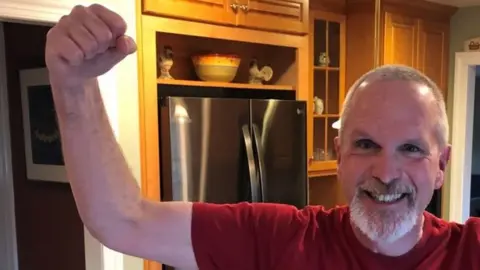Bankers' rate 'rigging' not criminal, says US
 Matthew Connolly
Matthew ConnollyA US appeals court has overturned the convictions of two former Deutsche Bank traders who were prosecuted for rigging interest rates.
In a legally significant judgment, US judges acquitted Matthew Connolly, 56, from New Jersey and Gavin Black, 52, from Twickenham, Middlesex.
The court ruled that their conduct was not against the rules.
It means that what has been prosecuted as interest rate rigging in the UK is not regarded as a crime in the US.
The US Court of Appeals for the Second Circuit ruled that it was not against the rules to seek to influence the estimates a bank submits of the cost of borrowing cash.
That directly contradicts a key British appeal court ruling that was used to prosecute 24 traders, nine of whom were jailed between 2015 and 2019.
For Mr Connolly and Mr Black, it's the end of an eight-year struggle to prove that what they were accused of was not criminal.
The evidence against Matt Connolly was just four emails from 14 years ago, asking for high or low interest rate estimates to be submitted.
Matt Connolly told the BBC on Thursday he was "speechless" to have won in court for the first time.
"My family and I are very thankful this ordeal is finally ending, and that the courts have finally recognised once and for all my innocence," he said.
"I am hoping the rest of the story emerges so others that have been denied justice get their peace as well."
"The nine trials on both sides of the Atlantic have been a whole series of miscarriages of justice where innocent people were jailed who had done nothing wrong.
"The only Libor 'rigging' that was really bad was the lowballing. That was ordered from the top - from central banks and governments. And neither the Department of Justice nor the Serious Fraud Office has ever brought that to trial."
Email evidence
The evidence against Mr Connolly was only four emails that he had sent 12 years previously.
A BBC investigation in 2019 raised questions about the safety of his convictions.
A few weeks later, a judge in the New York court gave them light sentences of home confinement after learning that the Bank of England had been involved in the same conduct on a much larger scale.
Judge Colleen McMahon said at the time: "I'm always uncomfortable when I'm asked in any context - it usually happens in the drug context - to sentence the low man on the totem pole while the big guy goes free."
The evidence against traders, both in the US and the UK, were emails and messages requesting that colleagues publish "high" or "low" estimates of the cost of borrowing cash.
The estimates would be averaged to get a rate called Libor (London Interbank Offered Rate) which is being phased out in favour of other benchmarks.
Libor estimates
What the FTSE or Nikkei are to share prices, Libor was to interest rates - an index that tracked the cost of borrowing cash between the banks.
It was used to set interest rates on millions of residential and commercial loans around the world.
To work out Libor each day, 16 banks answered a question - at what interest rate could they borrow money? They submitted their answers and an average was taken.
The evidence against Tom Hayes and other traders consisted of messages and emails asking for those interest rates to be submitted "high" or "low".
There were no laws or written regulations about Libor at the time the traders made the requests.
In late 2014, lawyers for Tom Hayes, the first trader jailed for rate rigging, argued that because there was no rule against the traders' requests the case should be dismissed.
In January 2015, Lord Justice Davies ruled that it was "self-evident" that the requests were against the rules.
Banks were not allowed to take into account commercial interests, such as trading positions linked to the Libor rate, when making their estimates.
That ruling was used to prosecute 24 traders in the UK.
Mr Hayes, who got the longest sentence, told the BBC: "This considered court ruling completely contradicts [UK] Court of Appeal rulings ahead of my trial.
"Those rulings formed the basis of the case in law to prosecute not only myself but every trader subsequently who faced trial.
"Four times, traders have been denied leave by the Court of Appeal to make the case to the Supreme Court, when there is clearly a point of law of significance that needs to be heard at the highest level.
"I hope that the British courts will, in time, reach the same conclusion."
If you want to know more about this story, a BBC Radio 4 investigative podcast, The Lowball Tapes, will contain exclusive revelations. It will be broadcast in five parts, starting on 28 February at 1.45pm.
